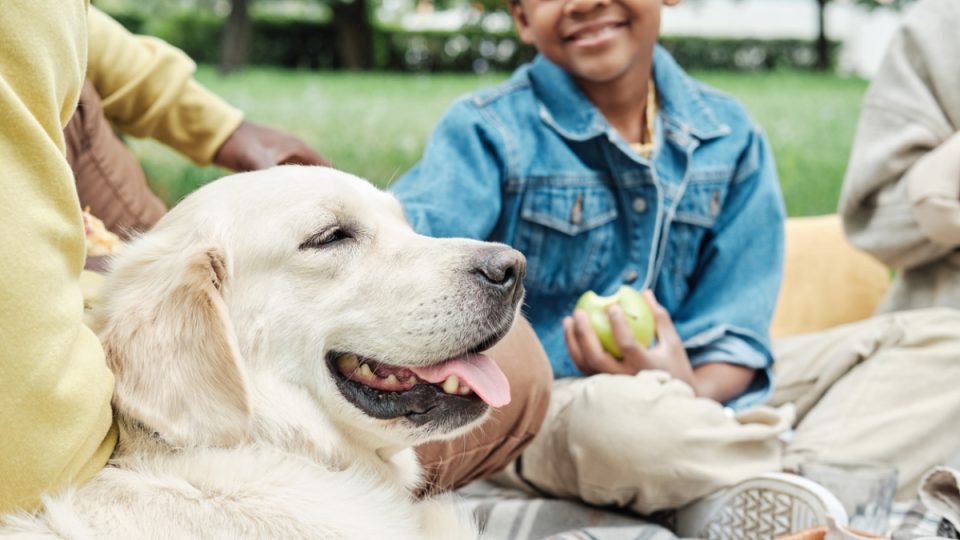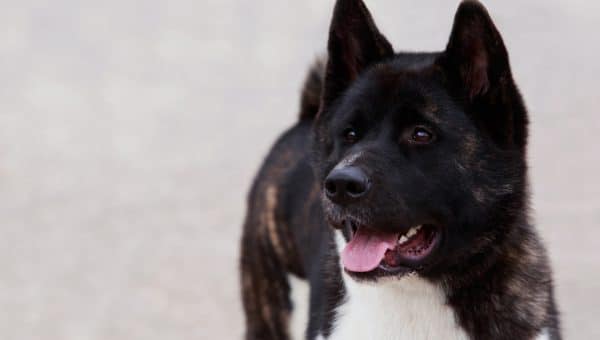Is anything more exciting than bringing a new dog into the family? Everyone has their idea of the perfect pup. But what is the best dog breed for your family when you have kids? Or maybe the kids you’re planning to have?
One quick way to breakdown the best breed for your family is the size of the dog. Size can factor into a lot of situations, from your lifestyle to space in a home. For example, Dominika Knossalla-Pado, CTC, MA suggests, “If barking is a trigger for you, you don’t want to choose a Miniature Schnauzer. Because they were bred to alert. And if you travel a lot, you want a dog that weighs under 20 pounds.”
Of course, size is not the only consideration.
If you’re ready to add a furry family member to your home, you’ve come to the right place. We dove beyond breed stereotypes and chatted with experts to help you find the best family dog that is most likely to mesh with your lifestyle and kids. Read on to discover what other factors can inform what your ideal family dog looks like or watch this quick video to find out the results.
Does Breed Type Determine “Kid-Friendliness”?
People previously believed that personality and behavior were linked to dog breed. So they chose their family dog based on the American Kennel Club’s category or the breed’s reputation.
But new studies have examined dog genetics to see if behavior is coded in canine DNA. Pairing the data with owner surveys, researchers discovered that only 9% of dogs demonstrated the personalities their breeds were “supposed” to have. And some dogs went in the complete opposite direction of expectations. (Pit Bulls, for example, didn’t display the aggression their breed was reported to have)
This suggests that behavior and personality have more to do with environment than breed. This means you may be able to go with any breed as long as you have the time and energy to train your dog how to behavior around kids. Regardless of breeds, you should always supervise your dog and kids when they are together. Puppies can get nippy or learn improper interactions with high-energy kids. On the other hand, some kids can be rough with smaller, more delicately built dogs and endanger their health or sense of security.
What Should You Look For in a Family Dog?
There are plenty of considerations when looking for a family dog. And it starts with ensuring you’re prepared for the responsibility that comes with dog ownership.
“I love when people book sessions with me before they get a dog,” says Knossalla-Pado. She’s a Certified Dog Trainer and the founder of Dog Meets Baby, a training program that helps parents introduce their dogs to infants and toddlers. This vital service helps families prepare and consider for the reality of having a dog, even if it means not getting the breed the envisioned.
If you are looking for a family dog, you need to ask yourself how:
- large (or small) will the dog be
- their personality mesh with your family’s lifestyle
- social the dog is, with kids and other pets
- active is the dog going to be
- much does the dog shed
- easy or difficult will training to be
- much barking is tolerable
Your lifestyle will help determine the dog breed that works best for your family. As will your tolerances.
Lucky for you, we’ve highlighted these considerations in the family-friendly breeds below. From personality to trainability, these seven factors can help you identify which dog breed will work best for your kids and family.
Large Kid-Friendly Dog Breeds
1. Labrador Retriever
Labrador Retrievers rank as the most popular breed in the United States. And it’s no wonder! Besides fitting into any family dynamic, they also excel at any activity you can think of: hunting, show, dock diving, tracking, and obedience. Knossalla-Pado recommends the English Labrador—a slightly larger, bulkier version—as the best large family dog.
- Size: Large
- Personality: Friendly, outgoing
- Sociability: Does well with children but may need supervision with other dogs
- Energy Level: Needs a high level of activity
- Grooming and Shedding: Requires weekly brushing; sheds regularly
- Trainability: Eager to please
- Barking: Moderate
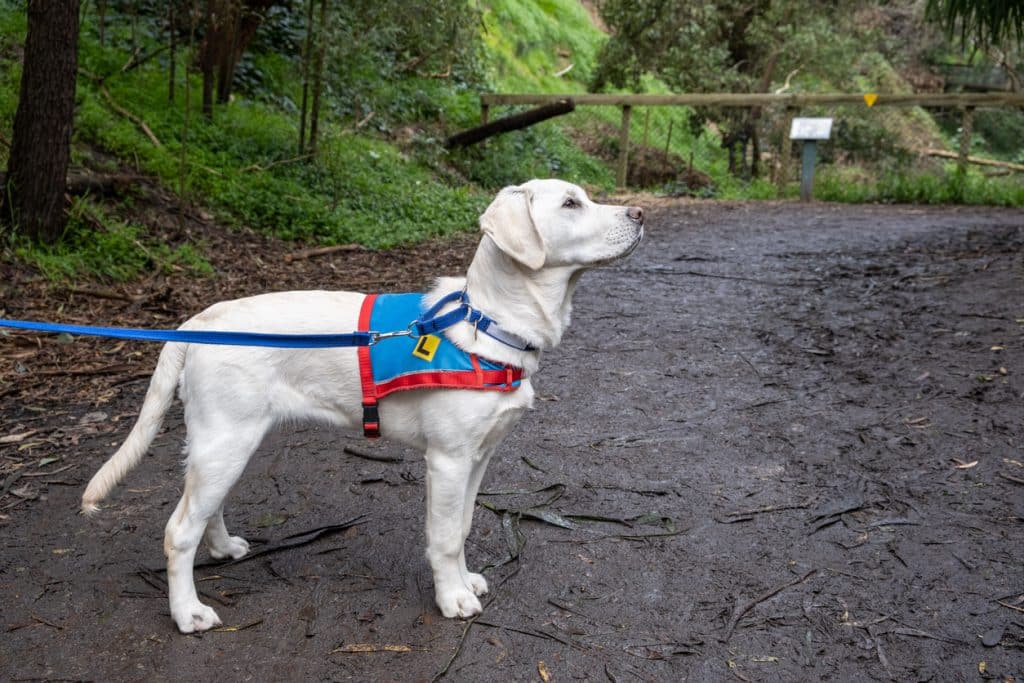
iStock/tsvibrav
See also: Labrador Retriever names, Labrador Retriever vs. Golden Retriever
2. Golden Retriever
Golden Retrievers are known for their big dog brains. And that keen intelligence makes them a delightful family dog, especially if you have older kids. But they’re friendly and gentle enough to get along with anyone.
- Size: Large
- Personality: Intelligent, Friendly, Devoted
- Sociability: Does well with children and other dogs
- Energy Level: Needs a high level of activity and daily exercise
- Grooming and Shedding: Needs occasional brushing; Sheds seasonally
- Trainability: Eager to please
- Barking: For attention
Fans of the Golden Retriever, however, call out “English Cream” variety of dogs with a watch-out. Because this type of dog is bred for their color, other aspects of health, behavior, and personality tend to be overlooked. As a result, they do not fit our description of family-friendly.
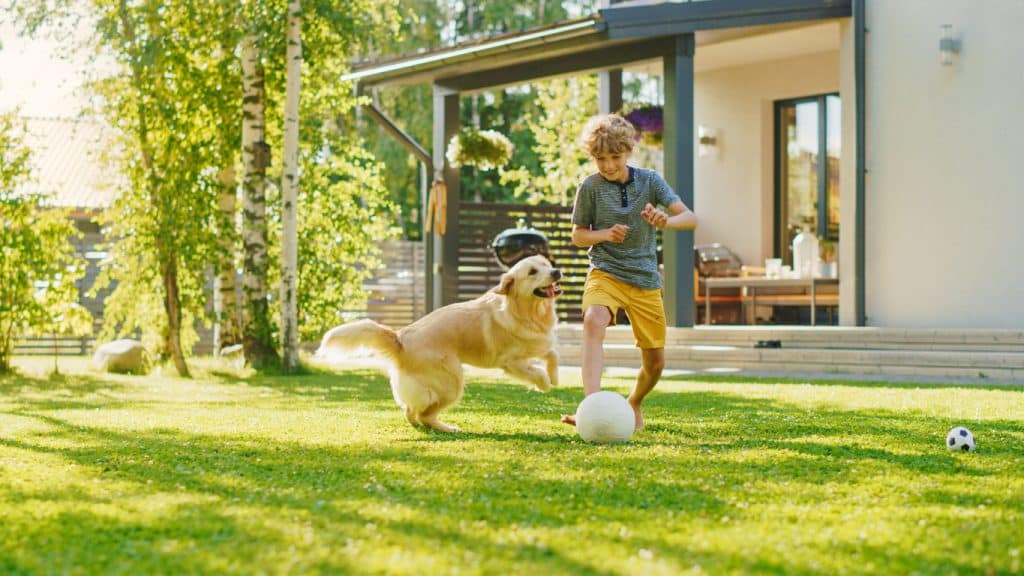
iStock/gorodenkoff
See also: Golden Retriever breed profile, Golden Retriever names, Smartest dog breeds
3. Boxer
Boxers have childlike personalities, and they love to play. This makes them a popular family dog choice. And since they seem to have a limitless energy store, they can keep up with your kids’ games!
- Size: Large
- Personality: Active, Bright, Fun-Loving
- Sociability: Does well with children but may need supervision with other dogs
- Energy Level: Needs a high level of activity
- Grooming and Shedding: Requires weekly brushing; Sheds occasionally
- Trainability: Easy
- Barking: Moderate
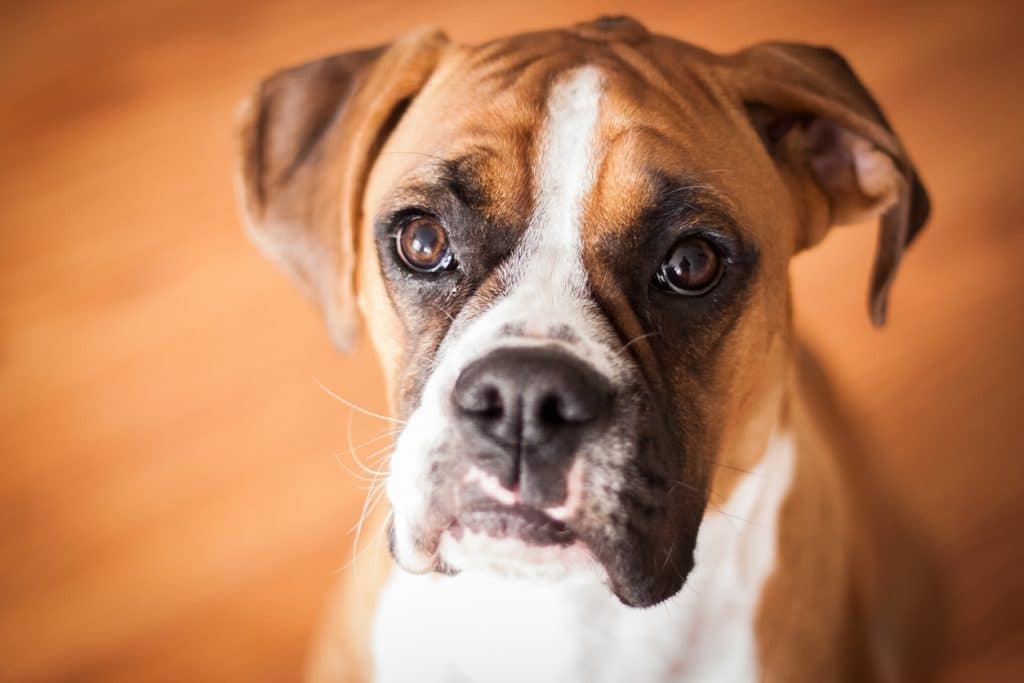
iStock/michael_lofenfeld
See also: Boxer breed information, Boxer dog names, gifts for Boxer lovers
4. Newfoundland
Newfoundlands have found employment as rescue dogs, courtesy of their loyalty and intelligence. And many families couldn’t imagine life without one of these “Gentle Giants” around the house.
- Size: Extra Large
- Personality: Sweet, Patient, Devoted
- Sociability: Does well with children and other dogs
- Energy Level: Somewhat active; Will need extra room for play
- Grooming and Shedding: Requires weekly brushing; Sheds seasonally
- Trainability: Easy
- Barking: Only when necessary
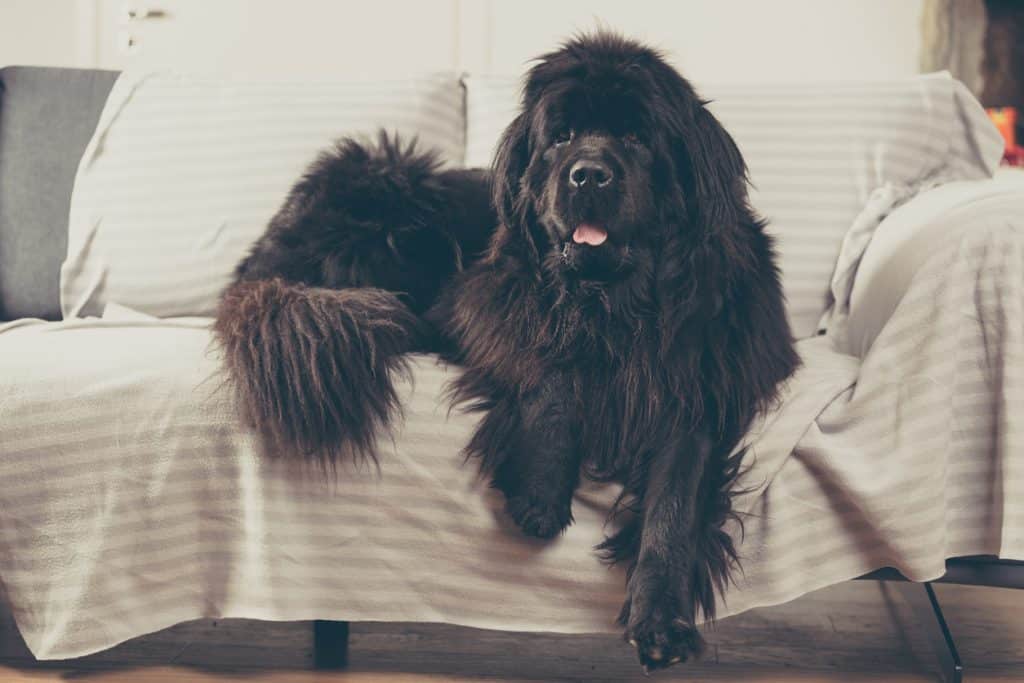
iStock/rzoze19
See also: Newfoundland dog facts, Newfoundland puppy information, Newfypoo breed guide
5. Bernese Mountain Dog
The Bernese Mountain Dog—or “Bernie”—can easily top 100 pounds. But they’re nothing more than piles of fluffy sweetness. And they have a loyal streak that doesn’t translate as aggression, keeping your kids under a watchful eye of protection.
- Size: Extra Large
- Personality: Good-Natured, Calm, Strong
- Sociability: Does well with children and other dogs
- Energy Level: Needs a high level of activity
- Grooming and Shedding: Requires brushing 2-3 times a week; Sheds frequently
- Trainability: Easy
- Barking: Moderate
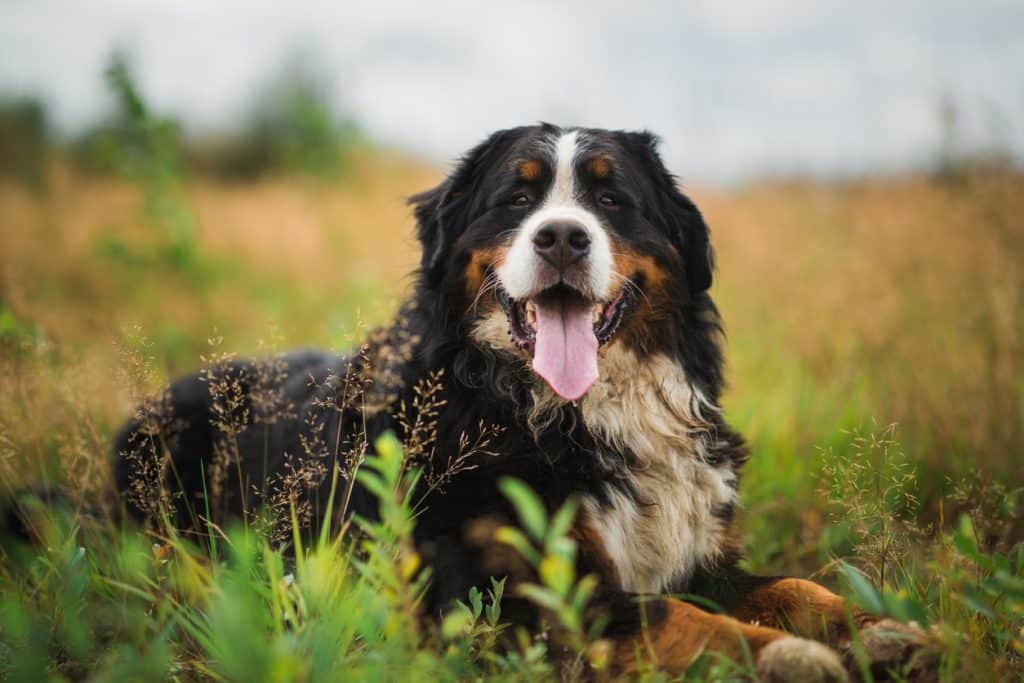
iStock/Aleksandr Zotov
See also: Bernese Mountain Dog breed profile, Bernese Mountain Dog names, Greater Swiss Mountain Dog vs. Bernese Mountain Dog
6. Irish Setter
Irish Setters look stunning and majestic with their flowing red hair. And while they have sterling reputations in the hunting world, they’re also fantastic breeds for families. Loving to run, they’re the perfect addition to households with active lifestyles.
- Size: Large
- Personality: Outgoing, Sweet-Natured, Active, Trainable
- Sociability: Does well with children and other dogs
- Energy Level: Needs a high level of activity and requires daily exercise; Will need extra room for play
- Grooming and Shedding: Requires weekly brushing; Sheds seasonally
- Trainability: Responds well
- Barking: Only when necessary
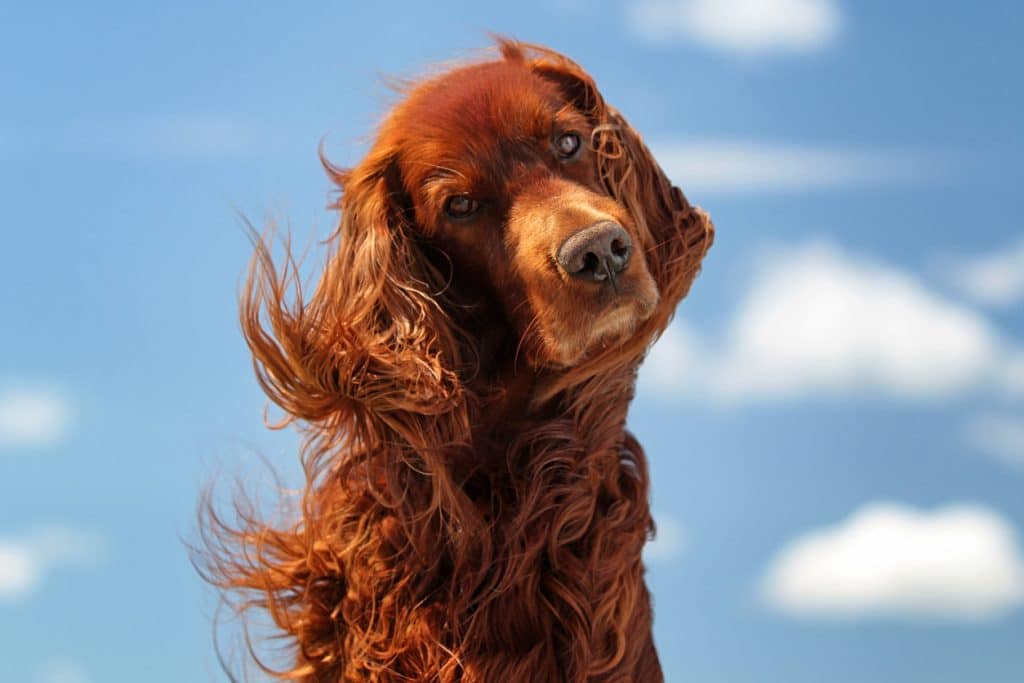
iStock/Drago_Nika
See also: Irish dog breeds, Irish dog names, red dog names
7. Great Dane
People may worry about giant breeds and kids. But the Great Dane is gentle and patient—the perfect large family dog. And they love nothing more than sharing space on the couch. (Though you may need to get oversized furniture to have room for everyone)
- Size: Extra Large
- Personality: Friendly, Patient, Dependable
- Sociability: Supervise with children and other dogs
- Energy Level: Needs a high level of activity
- Grooming and Shedding: Occasional bath and brushing; Sheds seasonally
- Trainability: Agreeable
- Barking: Moderate
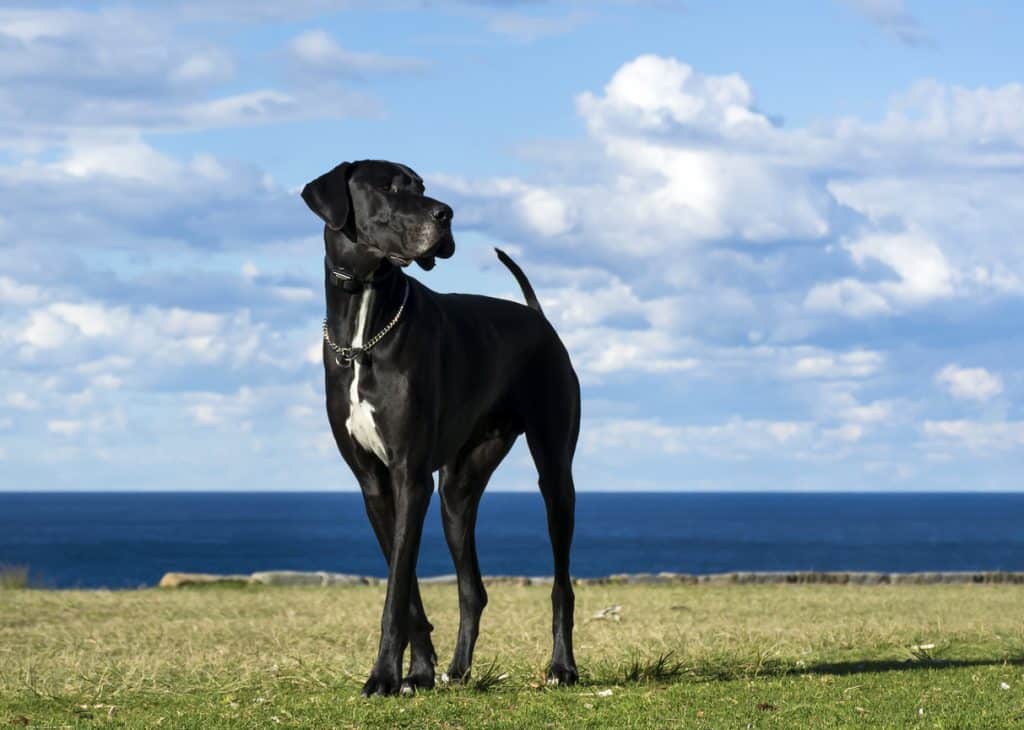
iStock/RugliG
See also: Great Dane profile, Great Dane personality, Great Dane names
Medium Kid-Friendly Dog Breeds
8. English Bulldog
English Bulldogs have an instantly-recognizable face that appeals to kids and adults alike. But they’re also adaptable, fitting in around the city dog park or out in the country air. They also love to participate in family games—even if you hear them snorting.
- Size: Medium
- Personality: Calm, Courageous, Friendly, Dignified, Amusing
- Sociability: Does well with children and other dogs
- Energy Level: Not very active, but still requires regular walks
- Grooming and Shedding: Requires weekly brushing; Sheds seasonally
- Trainability: Responds well
- Barking: Quiet
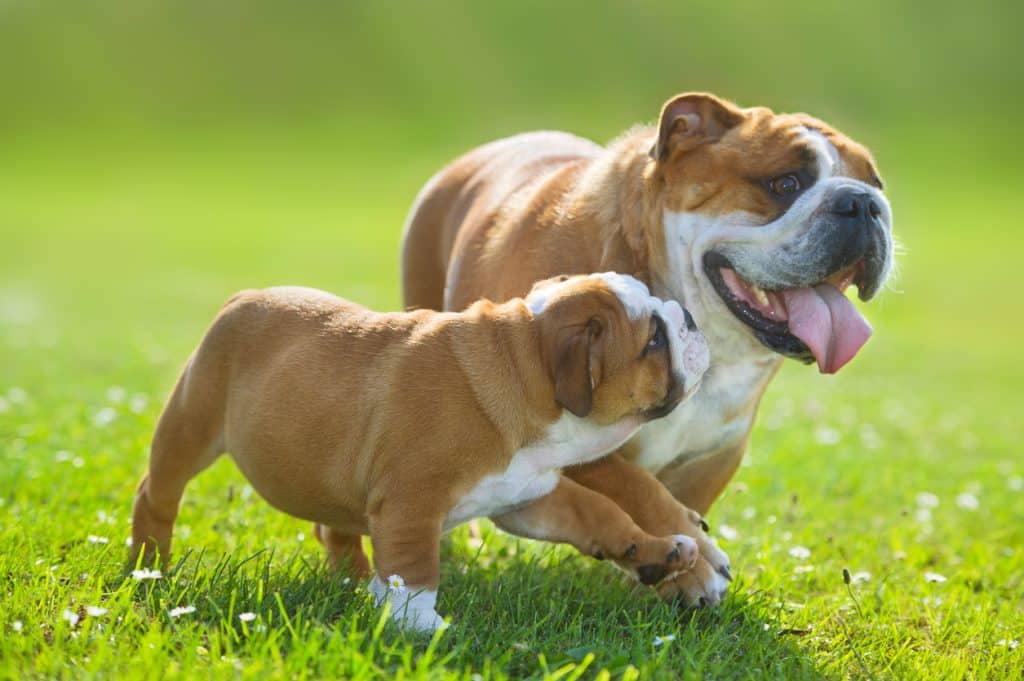
iStock/tkatsai
See also: English Bulldog breed profile, English vs. French Bulldog, grooming an English Bulldog
9. Vizsla
Vizslas have a stunning look that stands out from the other Sporting Group breeds. And they don’t have an undercoat, so you don’t need to worry about intense grooming sessions—or the cost of a groomer. This low-maintenance approach makes them the perfect family dog for active kids of varying ages.
- Size: Medium
- Personality: Energetic, Affectionate, Gentle
- Sociability: Does well with children but may need supervision with other dogs
- Energy Level: Needs a high level of activity
- Grooming and Shedding: Requires weekly brushing; Sheds seasonally
- Trainability: Eager to please
- Barking: Moderate
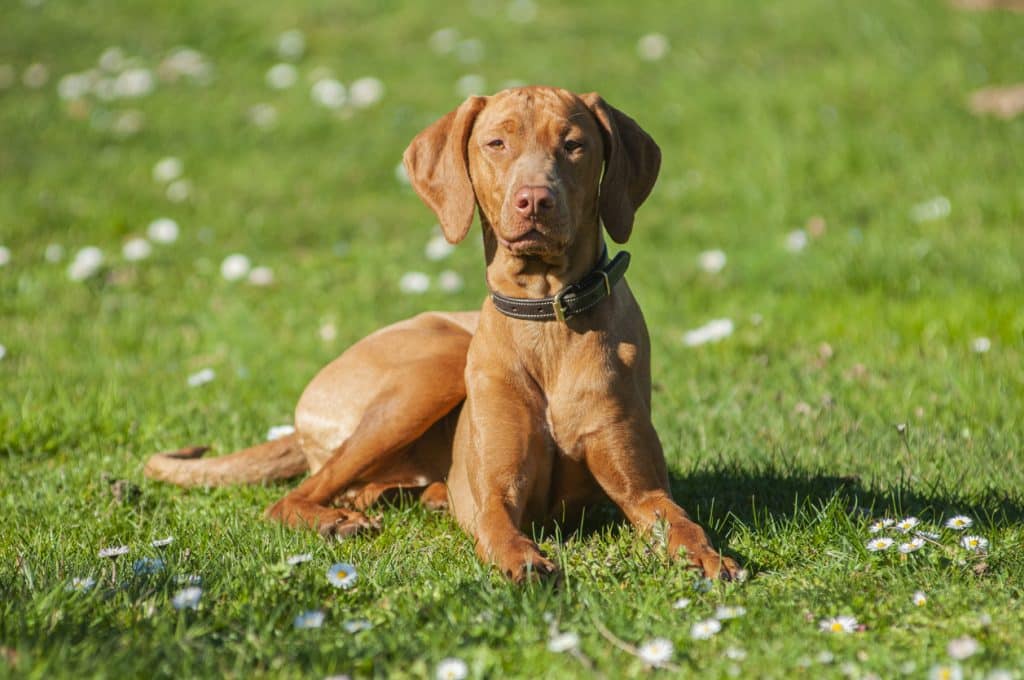
iStock/Anna Pozzi
See also: Vizsla breed profile, Vizsla facts
10. Samoyed
Samoyeds—or “Sammys”—have a characteristic smile that translates to their friendly disposition. They’re loyal family dogs that quickly adapt to your household routine. And if you’re an experienced dog owner with older kids who are dedicated to being part of the training, they’ll fit right in.
- Size: Medium and Large
- Personality: Friendly, Gentle, Adaptable
- Sociability: Does well with children but may need supervision with other dogs
- Energy Level: Needs a high level of activity
- Grooming and Shedding: Requires brushing 2-3 times a week; Sheds seasonally
- Trainability: Medium
- Barking: High
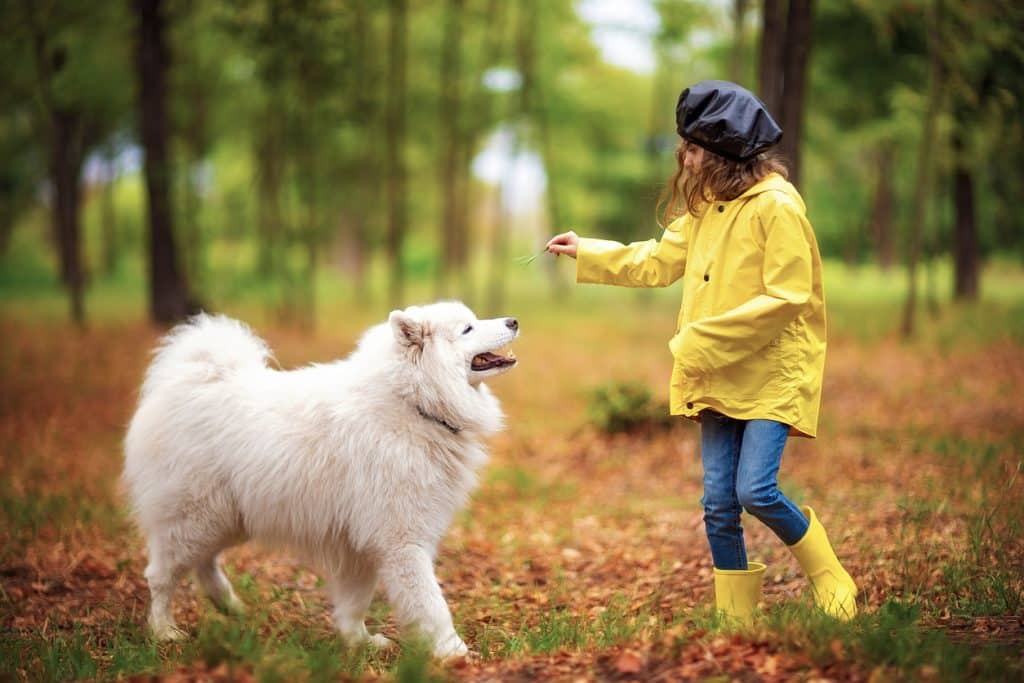
iStock/Oleksandr Zamuruiev
See also: Samoyed grooming tips, Samoyed puppy guide, white dog names
11. Bull Terrier
Bull Terriers have a mischievous streak that appeals to older kids and active families. These canines love to play the clown! And their sturdy bodies make them the ideal rough-and-tumble playmate.
- Size: Medium
- Personality: Playful, Charming, Mischievous
- Sociability: Supervise with children; Not recommended with other dogs
- Energy Level: Needs a high level of activity
- Grooming and Shedding: Requires weekly brushing; Sheds seasonally
- Trainability: Agreeable
- Barking: Moderate
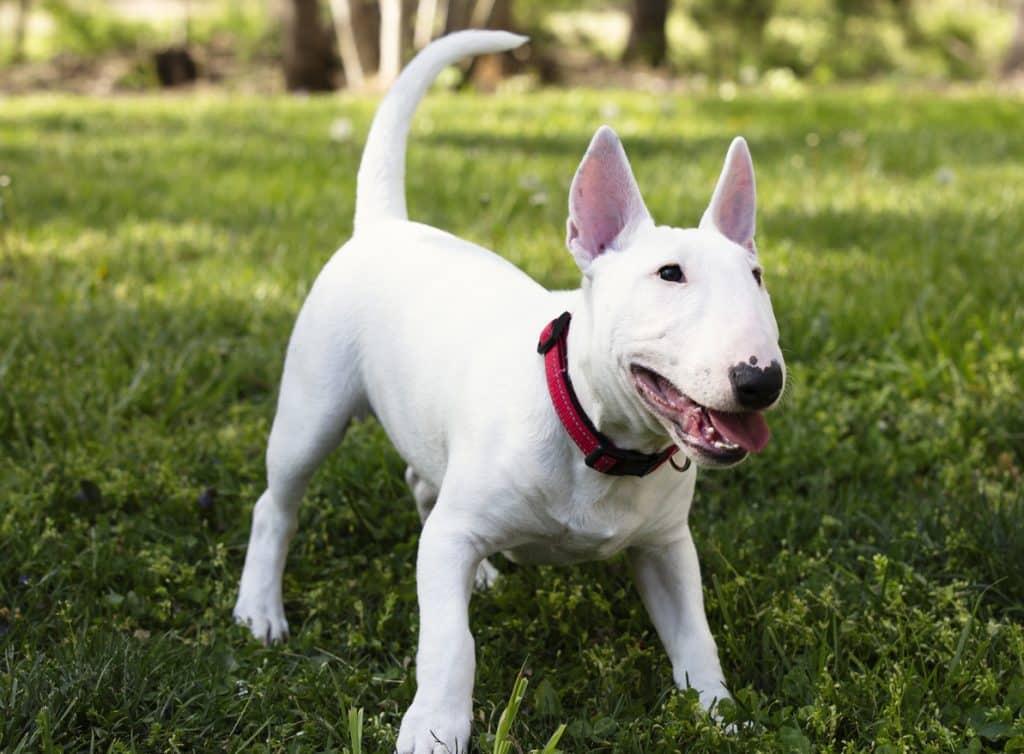
iStock/cindygoff
12. Poodle
Poodles are the ultimate family dog that doesn’t shed. You can choose from three different sizes—toy, miniature, and standard—to suit the space of your home. And those clever canine minds make them the perfect companions for kids who like to invent games.
- Size: Small and Medium
- Personality: Active, Proud, Very Smart
- Sociability: Does well with children but may need supervision with other dogs
- Energy Level: Needs a high level of activity
- Grooming and Shedding: Requires daily brushing; Sheds infrequently
- Trainability: Eager to please
- Barking: Vocal
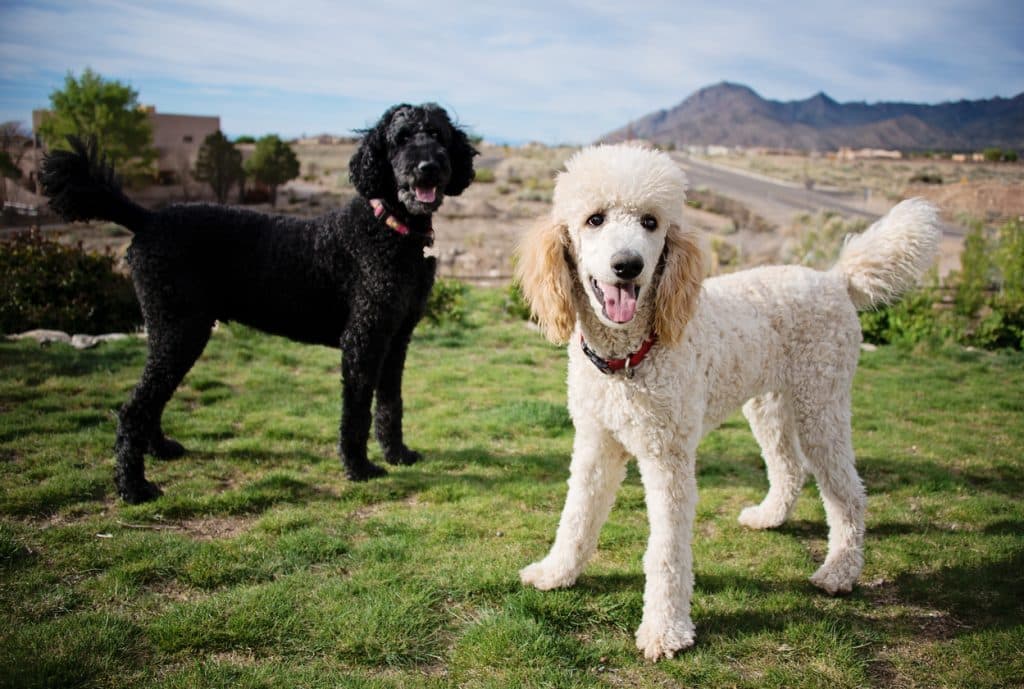
iStock/ivanastar
See also: Poodle haircut styles, Poodle breed profile, top Poodle names
Small Kid-Friendly Dog Breeds
13. Cavalier King Charles Spaniel
Cavaliers have a sweet expression that immediately pulls at a person’s heartstrings. And Knossalla-Pado recommends the breed as the best small family dog. They get along with everyone and are a cinch to care for—the perfect combination!
- Size: Small
- Personality: Outgoing, Sweet-Natured, Active, Trainable
- Sociability: Does well with children and other dogs
- Energy Level: Needs regular exercise
- Grooming and Shedding: Requires weekly brushing; Sheds occasionally
- Trainability: Easy
- Barking: Moderate
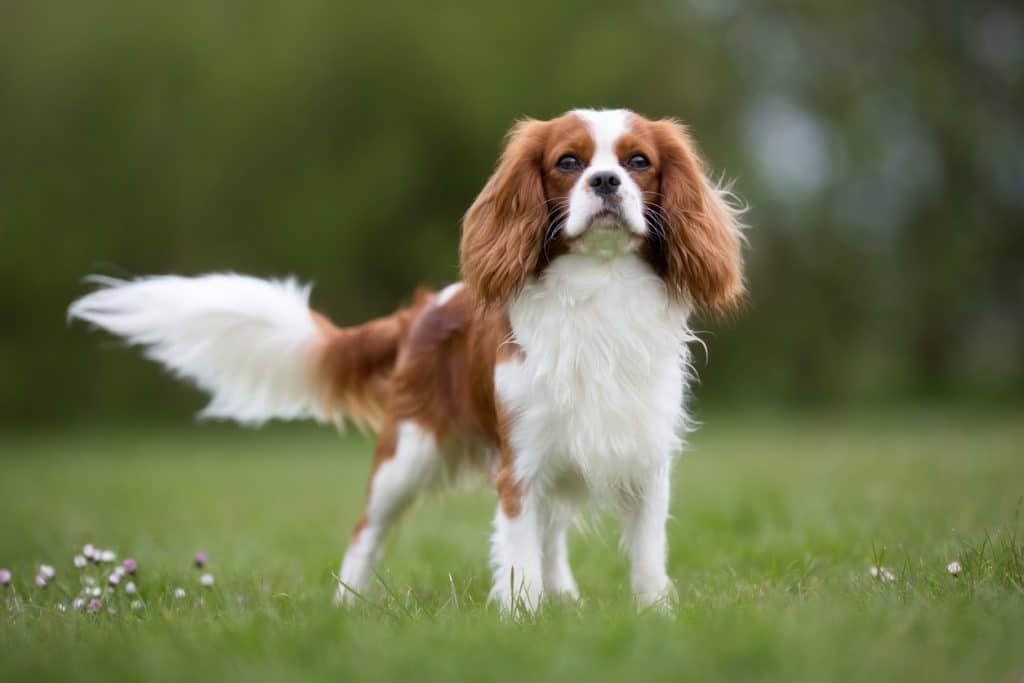
iStock/Bigandt_Photography
See also: Cavalier King Charles Spaniel breed profile, Cavalier King Charles Spaniel names, grooming a Cavalier King Charles Spaniel
14. Beagle
Beagles are delightful canine companions. They’re always up for a game of exploration, which makes them a popular breed with kids. And their care isn’t demanding, something that appeals to parents.
- Size: Small
- Personality: Merry, Friendly, Curious
- Sociability: Does well with children and other dogs
- Energy Level: Needs a high level of activity and daily exercise
- Grooming and Shedding: Requires weekly brushing; Sheds seasonally
- Trainability: Responds well
- Barking: Very vocal
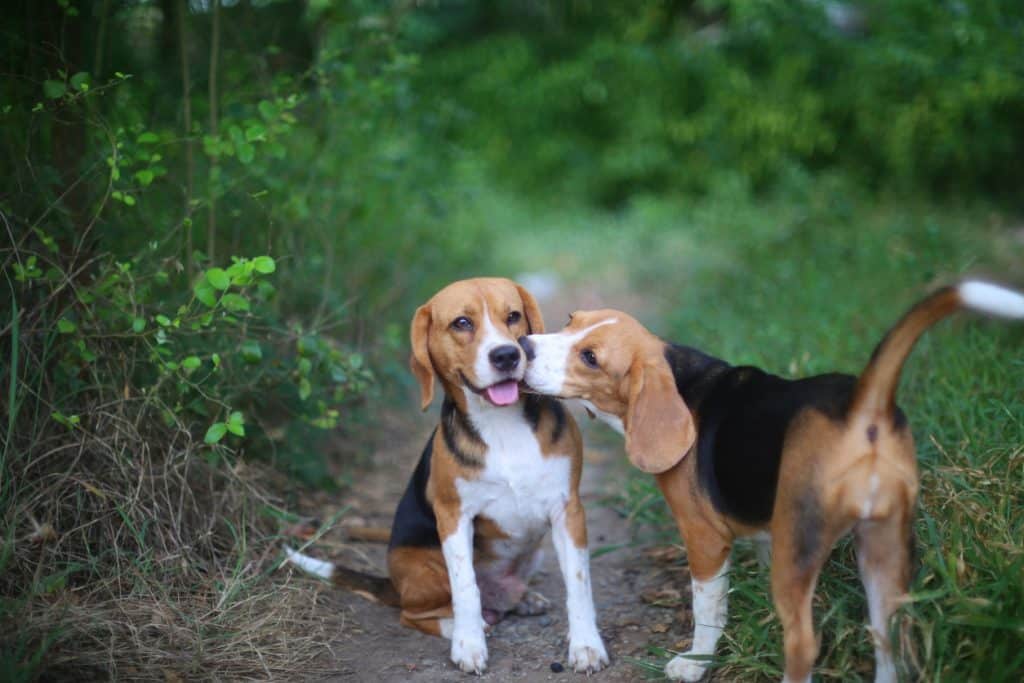
iStock/kobkik
See also: Beagle breed profile, Beagle personality, popular Beagle names
15. French Bulldog
French bulldogs are almost as popular as Labrador Retrievers, especially among families who live in cities. Those great big ears and adorable snorts instantly attract everyone. And they take fantastic pictures!
- Size: Small
- Personality: Playful, Smart, Adaptable, Completely Irresistible
- Sociability: Does well with children and other dogs
- Energy Level: Not very active; A brisk walk will keep them trim
- Grooming and Shedding: Requires occasional brushing; Sheds seasonally
- Trainability: Responds well
- Barking: Quiet
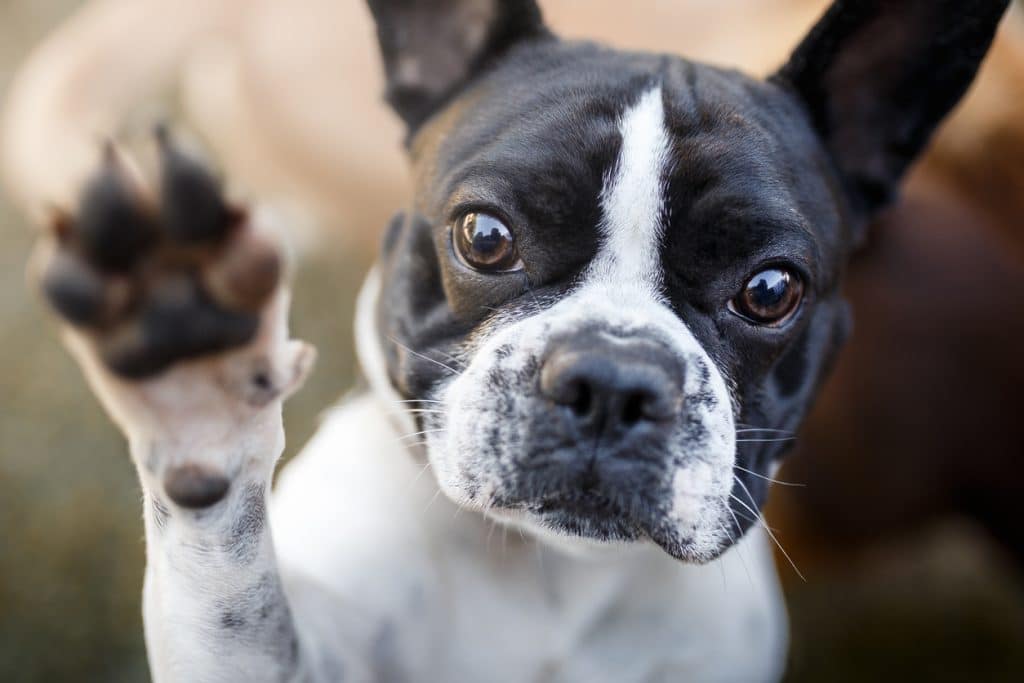
iStocks/Capuski
See also: French Bulldog breed profile, French Bulldog grooming tips, French Bulldog vs. Boston Terrier
16. Pug
Did you know Pugs have their own motto? Multum in parvo or “much dog in a small space.” And it fits this canine perfectly. Pugs do well with everyone, everywhere, making them an ideal dog breed for families.
- Size: Small
- Personality: Even-Tempered, Charming, Mischievous, Loving
- Sociability: Does well with children but may need supervision with other dogs
- Energy Level: Somewhat active; Requires regular exercise to avoid obesity
- Grooming and Shedding: Requires weekly brushing; Sheds regularly
- Trainability: Agreeable
- Barking: Only when necessary
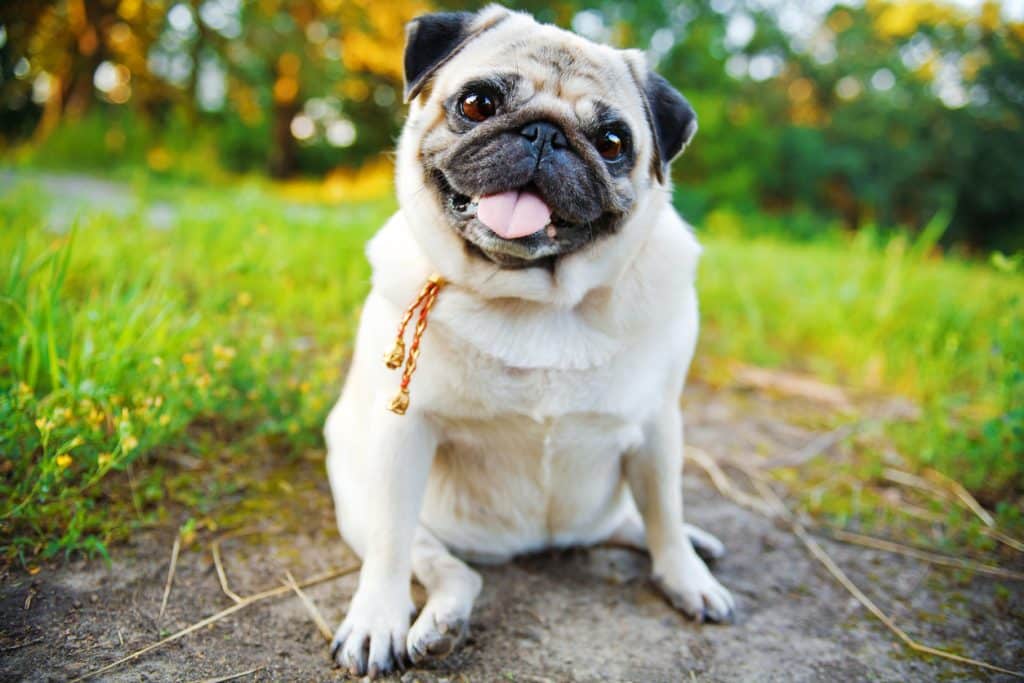
iStock/o_sa
See also: Pug breed profile, popular pug names, gifts for pug lovers
17. Bichon Frise
Maybe you’re hesitant to choose a “little white dog” as a family dog. But the Bichon Frise is a fluff ball that loves to play—with whomever they encounter. And they rarely shed, making them the perfect choice for households with allergies!
- Size: Small
- Personality: Curious, Playful, Peppy
- Sociability: Does well with children and other dogs
- Energy Level: Needs a high level of activity
- Grooming and Shedding: Requires professional grooming; Sheds infrequently
- Trainability: Easy
- Barking: Moderate
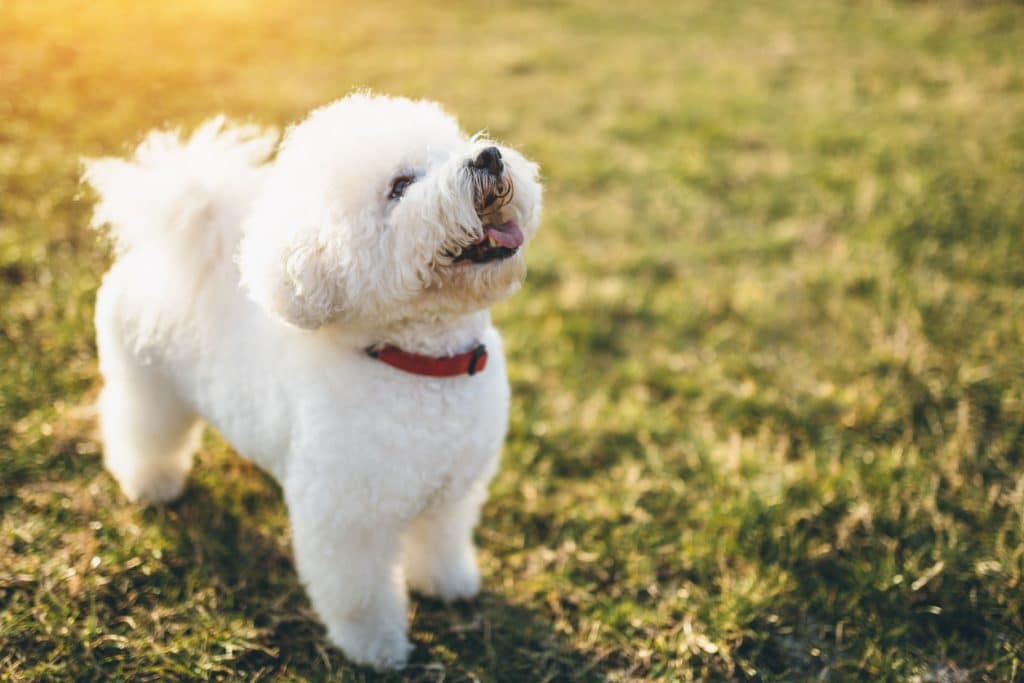
iStock/MilanEXPO
See also: Bichon Frise breed profile, Bichon Frise haircuts, Poochon (Bichon Frise and Poodle mix)
18. Boston Terrier
Boston Terriers sport an attractive “tuxedo” that appeals to the fashionable and family-oriented alike. And their small size works for everyone in the city. They love a rousing game of fetch that will help keep your kids entertained.
- Size: Small
- Personality: Friendly, Bright, Amusing
- Sociability: Does well with children but may need supervision with other dogs
- Energy Level: Needs a high level of activity
- Grooming and Shedding: Requires weekly brushing; Sheds occasionally
- Trainability: Easy
- Barking: Only when necessary
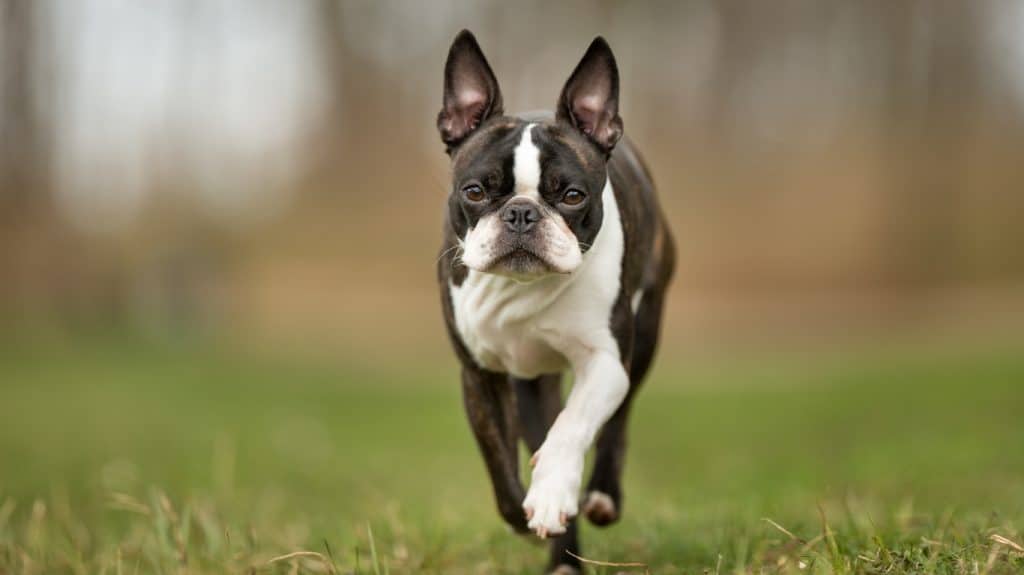
iStock/Bigandt_Photography
See also: Boston Terrier guide, Boston Terrier grooming tips, Boston Terrier names
19. Cocker Spaniel
Cocker Spaniels are the smallest dogs in the AKC’s Sporting Group. But they’re also peaceful and attentive to the emotions of the people around them. And they have the patience that encourages them to fetch as many tennis balls as your kids want to throw.
- Size: Small
- Personality: Smart, Happy, Gentle
- Sociability: Does well with children and other dogs
- Energy Level: Needs a high level of activity and daily exercise
- Grooming and Shedding: Requires daily brushing; Sheds seasonally
- Trainability: Easy
- Barking: Moderate
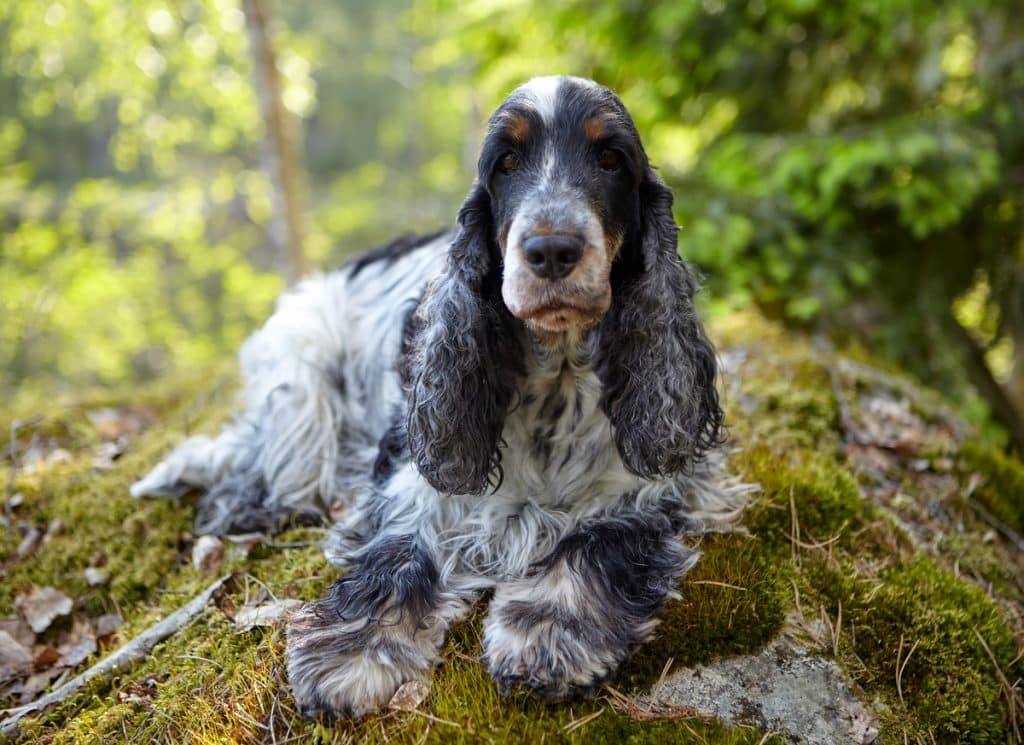
iStock/Yuriy Kozak
See also: Cocker Spaniel breed profile, Cocker Spaniel haircuts, Cocker Spaniel vs Springer Spaniel
20. Dachshund
Daschunds love adventures, and they’re built to race along the ground, over obstacles, and under low furniture. They have three different coat types available—smooth, long, and wire—which allows your family to choose what will work best with your lifestyle.
- Size: Small
- Personality: Curious, Friendly, Spunky
- Sociability: Supervise with active children and other dogs
- Energy Level: Requires regular exercise
- Grooming and Shedding: Requires weekly brushing; Sheds occasionally
- Trainability: Easy
- Barking: Frequent
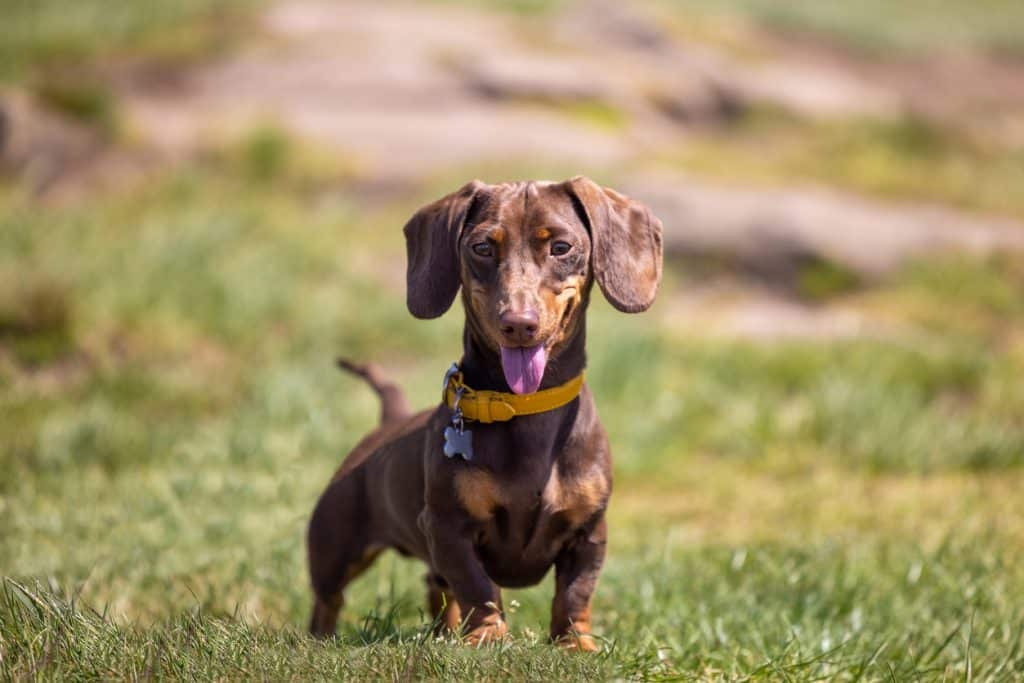
iStock/dapec
See also: Daschund breed profile, top Daschund names, grooming long haired Daschunds
Have You Budgeted for the Breed You Want?
Multiple costs go into owning a dog. And those fees don’t disappear simply because you choose a family-friendly breed, to buy from a breeder, or adopt from a shelter. Certain breeds, such as the French Bulldog, are known to have more medical issues later in life that require surgery. Other dogs, like the Samoyed and Poodle, may have you spending more in the grooming department than a Beagle or Boxer.
Here’s how our list of family dogs stacks up in terms of costs, from most expensive to least:
- French Bulldog
- Bulldog
- Newfoundland
- Bernese Mountain Dog
- Samoyed
- Cavalier King Charles Spaniel
- Irish Setter
- Bull Terrier
- Cocker Spaniel
- Boston Terrier
- Bichon Frise
- Golden Retriever
- Vizsla
- Daschund
- Pug
- Poodle
- Boxer
- Labrador Retriever
- Great Dane
- Beagle
This doesn’t consider the checklist items you and your kids will need to pick out, from toys, beds, a fun collar, harness, and leash. Then there’s the food to decide on and keep stocked and the vet bills.
Every dog, regardless of breed, will need routine veterinary care to keep them happy and healthy. Not to mention pet insurance, which can help offset surprising and large financial costs around potential illnesses and accidents.
The costs add up quickly!
Dog Facts and Family Lifestyle Factors to Consider
Dogs teach kids essential skills, such as responsibility and patience, but not every breed is suitable for this task. You will need to consider more than the fun and cuteness factor of owning a dog.
To adopt or go to a breeder?
The fact is where you get your next family dog is less important than how you go about choosing your pup.
As Knossalla-Pado says, you want a dog who’s excited to see you. “You can pet them, stop, and the dog is, like, ‘Why did you stop petting me?’” To be able to determine this, you’ll want to take your time supervising how your potential new dog interacts with everyone in the family.
Knossalla-Pado suggests learning about dog body language and keeping an eye out for specific cues, rather than relying on the “great with kids” tagline that often accompanies breeder and rescue sites.
Ask yourself, “Is the dog trying to avoid my kid? Am I seeing a lot of stress, like running away or yawning?” That lets you know the dog, no matter what breed, isn’t comfortable around children and won’t make an ideal family dog.
Should you get a puppy, adult, or senior dog?
There’s nothing more adorable than babies and puppies, but you want to think of what stage of canine maturity will work best with the age of your kids. “Parents expecting a child have this vision of pushing a stroller and walking a dog. And that doesn’t always happen,” admits Knossalla-Pado.
Adults and senior dogs tend to be more relaxed than puppies, making them a better choice for homes with young children. And puppies require lots of extra attention and care, making them suitable for older kids.
But that doesn’t mean kissing your dreams of your kids learning to train a puppy out the window.
A good, involved adoption agency or breeder can tell you about a dog’s temperament—and they won’t be afraid to tell you if the dog or breed you like isn’t the right fit. Be honest about your lifestyle and capabilities when they interview you! Or, better yet, engage the services of a trainer like Knossalla-Pado to build the right foundation at home.
This table can help outline the right scenarios that help you choose the right dog for your family:
| Choosing a puppy | Choosing an adult dog |
| Meet the puppy’s parents | Ask about the dog’s history |
| Meet adult dogs from the same breeder, if possible | Have a meet and greet in different settings |
| Perform a Volhard Puppy Aptitude Test: A test to determine typical puppy behaviors, including social dominance, sensitivity, and stability | Perform a Dognition Dog Profile: Games that assess a dog’s problem-solving abilities to determine their personality type |
How do lifestyle factors determine what type of dog you get?
Sometimes you see dogs on other lists of family-friendly dog breeds. But here at Rover, we haven’t included them on our list. This is because instincts coded on the breeds’ DNA can interfere with the lifestyle of a boisterous household.
- Play dates and busy social lives: Guard dogs like German Shepherds are extremely loyal, but they can be too protective when you want to bring other kids or visitors over to the house. As Knossalla-Pado points out, that can create problems: “They’ll like your family, but it’s not the kind of dog that will be friends with everyone. If you have a busy social life and host playdates all the time, getting a guard dog isn’t the right idea.”
- Busy schedules: If you juggle work, kids’ activities, and other extracurriculars, you may not be home that much. And that’s rough on family dogs like Labrador Retrievers and Bichon Frises who experience separation anxiety.
- Small homes: You love your cozy apartment in the city. But that limited space isn’t ideal for breeds like Irish Setters and Great Danes who need room to stretch out and exercise.
- Outdoor activities: Maybe you do have the space for your dog to roam and play. But you don’t have the activities they’d prefer to stay out of trouble. Herding breeds like Collies and Australian Shepherds need to herd something like sheep, geese, or chickens to stay out of trouble. Otherwise, they’ll herd your kids and visitors, and that may involve a “friendly” nip.
What age should your kids be?
Knossalla-Pado recommends waiting until kids reach the pivotal age of four. Research shows that living with a dog in the early stages can benefit a child by increasing their development and problem-solving skills.
“There’s often a desire to have a puppy growing up with your children. Because it’s fun and sweet. And the pictures will be amazing. But the truth is, it’s much harder when your children are younger—infants and toddlers, especially pre-verbal toddlers,” she says.
This tracts with developmental milestones that the average four year old kids hits, where:
- They become helpful
- You’ll see them show compassion
- They learn to avoid risks
- And they can demonstrate physical dexterity
“It’s been my experience that around that age is when your child can follow directions. They’re also bigger,” says Knossalla-Pado, who also received this advice from a child psychologist. “So even if you have a tall dog, it places their head higher. And they’re going to be steadier on their feet. They can also play fetch, feed the dog, give treats. And they won’t eat the kibble or treats. Things get much easier.”
Frequently Asked Questions About Family Dog Breeds
Are some dog breeds more family-friendly than others?
Of course, there are some dog breeds that are more appropriate for families. This may be due to the domestication of dogs or a breeder’s decision to emphasize certain personality traits, like being calm, patient, and eager to please. Golden Retrievers are a good example of domestication and breeder’s choice to highlight traits.
If you are able to get a dog’s history, a mixed breed from an adoption agency may also be incredibly family-friendly as well. You might be surprised when doing a DNA test to find they are a mix of the breeds listed here.
What is the safest family dog?
Every dog is different, and—as research shows—environment means more than breed. But you’re looking for a family dog that displays these qualities:
- Patience around children, even when they’re playing
- Confidence, such as an interest in participating in new environments or childhood games
- Loyalty and protection of the family unit
- Forgiving nature
What is the most loyal family dog?
Research has suggested that loyalty is coded in a dog’s DNA. This earned loyalty is what convinced their wolf ancestors to start hanging out with humans in the first place.
The friendlier a dog breed is, the more loyal that canine appears to be to the family. And the dog that wins hands-down every time? The Labrador Retriever. (Probably why it keeps winning that Most Popular Dog Breed!)
What is the easiest family dog?
“Easy” depends on what qualities you’re looking for. Do you want a dog that’s easy to train? A friendly dog? A canine who won’t shed all over the house? Or a pup who’s eager to play? You can find one or more of these characteristics in all of the breeds we’ve mentioned, but here’s a quick roundup on dogs who are easiest to:
- Train: Golden Retriever
- Clean or groom: Poodle
- Socialize with dogs and kids: Bichon Frise
- Travel with: Cavalier King Charles Spaniel
And if you’re hoping for the complete package, the Labrador Retriever comes the closest to checking all the boxes. (That’s why it’s tops in popularity and has a place on the top family dogs).
Which dog breeds are not good with kids?
With dog bites a primary concern for parents with small children, you want to err on the side of caution. Puppies of all breed types will nip, but training a puppy to stop biting can curb this habit.
However breeds with an independent streak or dogs with more subtle and sudden body language, may take longer to train. High-energy children may excite or bother dogs, such as Australian Shepherds or Collies, in a way that reinforces mouthy behaviors.
Another breed with an independent streak, who won’t tolerate loud noises, is the Chihuahua. Chihuahuas generally prefer a household without young kids.
We also recommend avoiding guard dogs like the German Shepherd. While they’re extremely popular and good with kids, that fierce loyalty can lead to problems when friends come over to visit. And you don’t want a potential incident on your hands as a result of a playdate.
What dog breeds don’t get lonely?
There are dog breeds out there who love social interaction. They want to be around you and the family All. The. Time. But others don’t mind getting left on their own now and then. And these dogs are ideal for people who work longer hours:
- French Bulldog
- Boston Terrier
- Bull Terrier
- Pug
- Cavalier King Charles Spaniel
Bottom Line: The Family Environment Shapes a Dog’s Success
Once upon a time, the popular belief was that a dog’s breed determined their future personality. But new research has shown that dog behavior is a result of the environment.
As long as you’re able (and willing) to provide a happy, healthy home with plenty of positive reinforcement almost any breed can settle in with your family. The age of your kids can also influence how much active enrichment and careful training your dog gets.
And you want to consider the needs of the dog you’re hoping to bring home. Because while behavior isn’t in the DNA, certain habits are. And it isn’t fair to get upset with a dog exercising their instincts (such as herding or guarding) in lieu of their daily exercise or mental stimulation.
If this expands the type of dog you’re interested in, check out our breed selector to help with your decision. Remember, you can always contact a certified trainer or animal behaviorist to help you with the decision process.
And don’t forget to review our puppy links below to help get your new family member settled into the house once you select that family dog:
